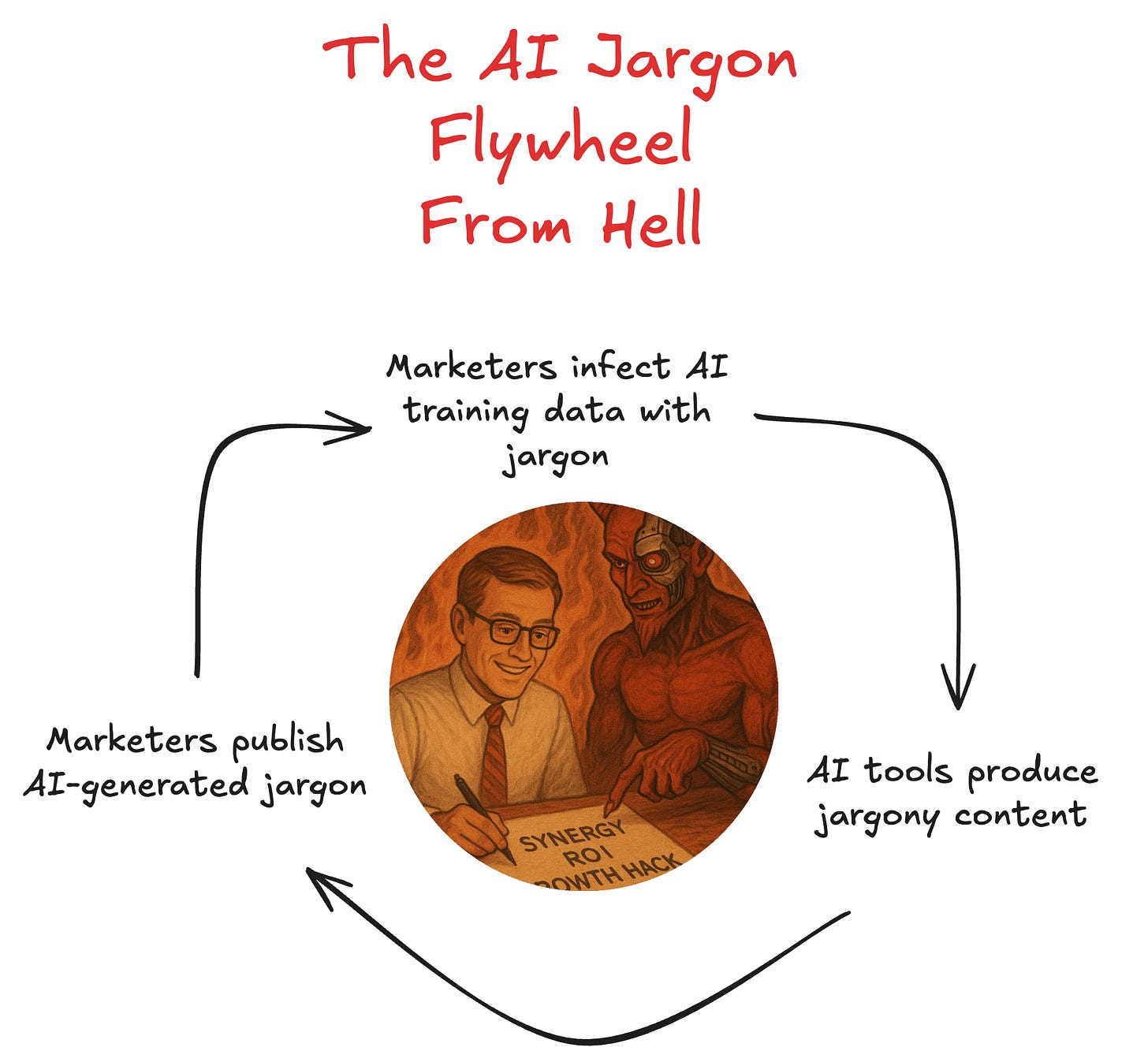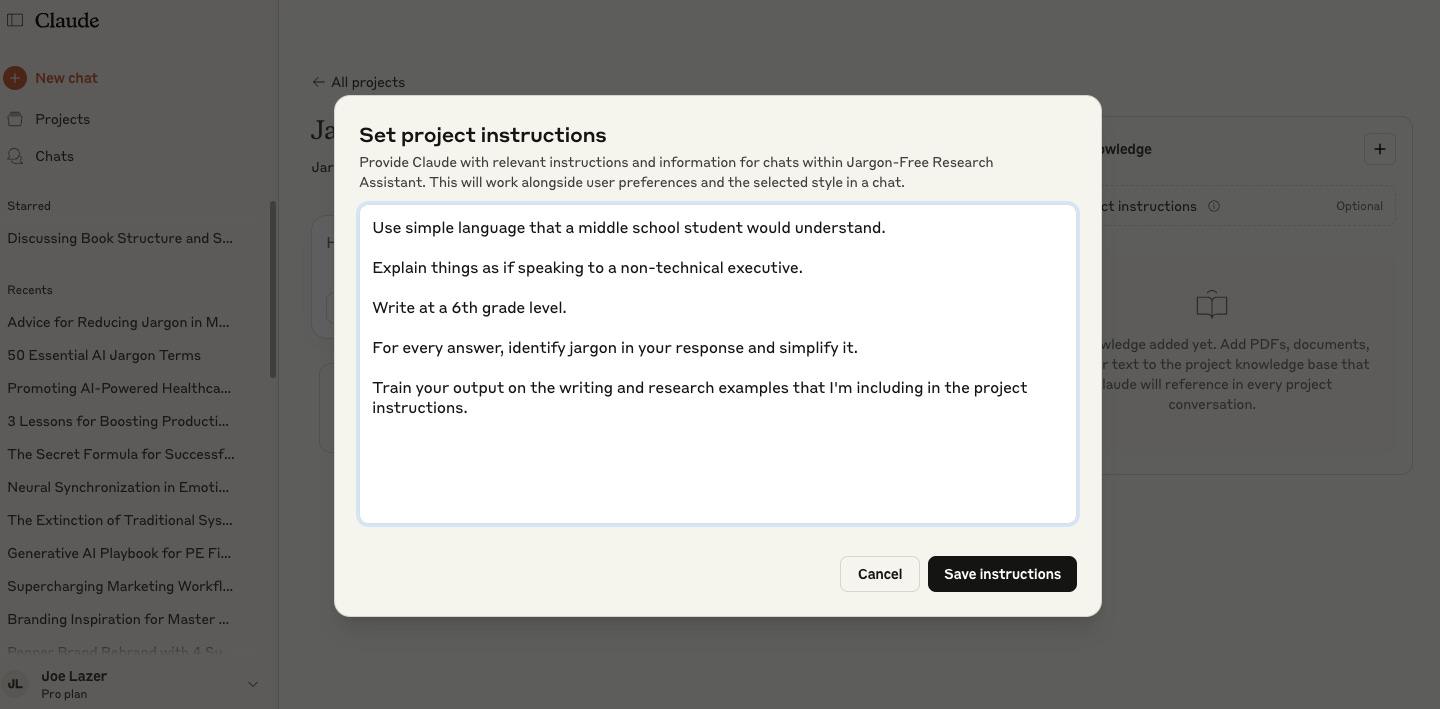The AI Jargon Flywheel From Hell
Jargon is sabotaging your marketing and sales, and AI is only making it worse.
If you’ve noticed that the jargon in your LinkedIn feed and inbox has gotten worse lately, you’re not crazy — it has. We’ve unlocked a new layer of corporate hell, and it’s all thanks to an over-reliance on generative AI.
AI tools like ChatGPT and Claude use more jargon than an insecure 23-year-old McKinsey analyst trying to bullshit his way through his first client meeting — and that’s by design:
These tools are trained on a large volume of marketing and technical content that’s poorly written and filled with jargon. That’s why so much AI writing is filled with meaningless babble like “groundbreaking,” “game-changing,” “landscape,” “delve,” and “holistic.”
When an LLM isn’t sure of an answer, it’s trained to hedge by spitting out extra text, basically like a student bullshitting their way through an answer.
AI systems are trained through Reinforcement Learning from Human Feedback (HRLF), in which humans rate the model’s responses to fine-tune it. These human workers tend to rate verbose answers more highly.
Since 90% of marketers now use AI, this creates a feedback loop that floods the web with an exponentially increasing amount of jargon-filled content.
I call it the AI Jargon Flywheel from Hell:
Marketers infect AI training data with jargon → AI tools produce jargon → Marketers publish AI-generated jargon, infecting the training data with more jargon.
This isn’t just annoying. It’s also way more damaging to marketing and sales than most people realize.
Jargon is sabotaging your marketing more than you think
A few years ago, researchers at Ohio State conducted a fascinating study. They had one group of consumers read three paragraphs about technology that only used simple terms. Then, they had another group read three paragraphs on the same topic, except this time, it was filled with specialized jargon.
For instance, the jargon group would read a sentence like: “This system works because of AI integration through motion scale and tremor reduction."
Meanwhile, the non-jargon group would see: “This system works because of programming that makes the robot's movements more precise and less shaky."
Even though the people who encountered the jargon were given definitions for all the terms, it almost made them mad. They didn't like what they were reading and even started arguing against it.
Conversely, the jargon-free group felt engaged and wanted to learn more.
Professor Hilary Schulman, the study's lead author, explained why: “The use of difficult, specialized words is a signal that tells people that they don't belong," she said. “You can tell them what the terms mean, but it doesn't matter. They already feel like this message isn't for them."
In other words, when you use jargon in your marketing, you’re giving your audience the middle finger — and telling them you’re not for them.
Sure, some industry terminology is necessary. It's impossible to write intelligently about content measurement, for instance, without using terms like unique visitors, cost-per-lead (CPL), or share of voice. But you still need to ensure we use those terms in simple, clear sentences and explain what they mean when necessary.
How to de-jargon your marketing and comms
De-jargoning your marketing isn’t easy. Marketers and sales teams are addicted to jargon, especially in tech. After enough circle-jerk conferences, your brain just melts, and you start to think that "Centralizing data from multiple sources for better efficiency and making data accessible across all teams offer all the essential components of an ideal modern data stack—and a way to keep your team engaged at work" is a perfectly reasonable thing to say.
That might seem like a ridiculous, made-up example, but it's from a real email I received from a well-known tech company!
Look all around you, and you’ll see marketing gibberish like this:
And this:
The answer to this problem isn’t to just not use AI. Marketing jargon was a massive problem before ChatGPT. Luckily, there are some simple steps you can take to free yourself from the Corporate Jargon Flywheel From Hell:
Go jargon hunting.
Sit down with your team for an hour and review key assets — your homepage, pitch deck, and latest blog posts. Give points for spotting needless jargon, then rewrite those sentences together.
Implement mandatory jargon checks.
Tired: Copy editing.
Wired: Jargon editing.
Implement jargon checks into your workflows. Drill into your team’s heads that they should be on the lookout for needless jargon at all times.
Train your team on how to de-jargon AI tools.
While you should never outsource your thought leadership to AI, it is a powerful tool for research, ideation, and formulaic writing tasks like nurture emails and landing page copy. I encourage my team to use AI for these things because it frees them up to do more meaningful creative work, and luckily, it’s pretty easy to get AI to stop using so much jargon.
Explicitly request simple language. When prompting AI, directly ask for "simple language that a middle school student would understand" or "explanations without technical terms."
Define the audience. Specify who needs to understand the content, like "write this for someone with little knowledge in marketing" or "explain things as if speaking to a non-technical executive."
Ask it to write at a specific grade level. Ex. “Write at a 6th-grade level” or “aim for a Flesch-Kincaid score below 50.”
Request feedback loops. At the end of your prompt, ask the AI to "identify jargon in its own response and simplify it."
Train it on your best, jargon-free writing examples. Feed AI systems the content you're most proud of and continuously remind them to reference those examples.
To save time, you can give ChatGPT and Claude all these instructions as part of a project.
Whether you’re using AI or not, de-jargoning your marketing and messaging is one of the simplest and most effective ways to boost your company’s performance.
Cut the jargon, and you’ll give yourself a huge advantage over the competition.
Content advice of the week
“Most good writing happens beyond the page. Gathering experiences, observing the world, letting ideas take shape. By the time you sit down to write, you’ve already lived through the material. Even if the exact words have yet to come.” — Rob Henderson
I loved this essay from Rob on what he’s learned after three years on Substack and 71K subscribers. He provides a great reminder: If you want to write well, you need something interesting to say. So spend as much time as possible talking to experts in your fields, reading interesting books and papers, and going deep on the topics that interest you the most.
Tool of the week: Opus
Note: This isn’t sponsored, but if you want to sponsor it, I’ll take your money.
Opus is an incredibly easy-to-use AI video editing and clipping tool. I can upload 45-minute clips of podcasts or talks that I’ve given and get back surprisingly strong clips and reels to use. One of my absolute favs.
If you liked this story, you might also like:









Good insight 😃. Can i translate part of this article into Spanish with links to you and a description of your newsletter?
The only difference I've seen in 30 years as editor and now content marketer is the speed to jargon.
I was groaning and shaking my head in disgust and agreement for this entire post.
My first job as an editorial intern in 1995 was sorting through the 5 or 6 bins of mail the editor would get over a month (capture and document management magazine) to write the "new stuff" column.
Reading/skimming that many press releases led me to quickly understand that no marketer wants to use a penny word when they can string together multiple dollar words together to obfuscate their point (if they had one, many didn't).
Out of curiousity (and as a potential way to find a few new clients), I'm running through IDP vendor websites and marketing materials. It remains mostly as shitty and self-referential as it did when I was a wee baby editor lo these many moons ago.
Every now and then, I get annoyed and write about this too. Last year was the last time: https://simplyusefulmarketing.substack.com/p/buzzwords-suck-and-confuse-customers